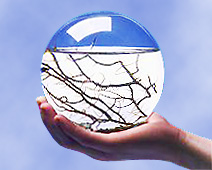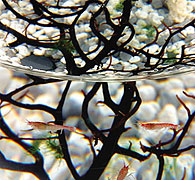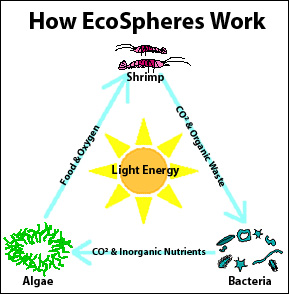Sven Blom
The EcoSphere Self-Contained Saltwater Ecosystem
Product of the future
The reason that I think the EcoSphere might be a product of the future is basically the failure of the BioSphere 2 project in Arizona. 8 Volunteers stayed in a closed environments and even with some little cheating ( adding extra oxygen) they didn’t succeed in getting an stable environment (http://www.bio2.com/tourinfo.htm ).
The EcoSphere is a very primitive example of the BioSpere. The interesting thing about it, is that the EcoSphere did manage to keep mammals alive for over 7 years. Although of course shrimps are very primitive animals, it might be the beginning of a new BioSpere, which could eventually result in possibilities to live independent in space or under water.
Besides the technical possibilities, the EcoSpere certainly is a interesting decoration that’s on the edge of humanity. Are we allowed to uses living animals as decoration?
The Original EcoSphere is the world's first totally enclosed ecosystem - a complete, self-contained and self-sustaining miniature world!
Unlike lower quality imitations, the Original EcoSphere is the most advanced sealed saltwater microcosmic world, harboring shrimp, algae and bacteria in a balanced, symbiotic environment. Requiring no feeding, The Original EcoSphere is easy to care for, and serves as an incredible learning tool that can provide powerful insights about life on our own planet... and provide a glimpse of the life sustaining technology that may shape the way we design and restore ecosystems.
But an Ecosphere is much more than a scientific breakthrough. It is a work of art--a living treasure to own or give to someone special. Each EcoSphere is carefully crafted to achieve an aesthetic, meditative beauty that can soothe any environment, including home, classroom or office.
The Inside Story
Inside each EcoSphere are active micro-organisms, bright red shrimp and algae, each existing in a clear "soup" of filtered sea water. Because the EcoSphere is a self-sustaining ecosystem, you never have to feed the life within. Simply provide your EcoSphere with a source of indirect natural or artificial light and enjoy this aesthetic blend of art and science, beauty and balance. Because the living resources within the EcoSphere utilize their resources without overpopulating or contaminating their environment, the EcoSphere requires no cleaning and only minimal care. EcoSpheres have an average life expectancy of two years. However, it is not uncommon for shrimp populations to be thriving in systems as old as 7 years. Older units can be "recharged." EcoSpheres are available in either pod or spherical shapes, in a range of sizes. We can even custom design and install larger ecosystems for home and business use.
A Glimpse Into the Future
The EcoSphere is the result of technology developed by scientists at NASA's Jet Propulsion Laboratory. NASA was researching self-contained communities for space explorers to live in during long-term space flights. Out of this research came the EcoSphere - an ecosystem of animal and plant life in perfect balance.
How EcoSpheres Work
The EcoSphere is a display of a working ecological system. While it is beautiful to view, it also demonstrates the delicate balance of a closed ecosystem like the Earth. Contained within the completely sealed glass is a small variety of shrimp, algae, and microorganisms living in a filtered sea water environment.
The EcoSphere contains some of the same essential elements that are found on our planet. The Earth is represented by the gravel at the bottom with water filling two-thirds of the system while air fills the balance of the space. Fire is the light, which streams in each day. Finally, life: the algae, shrimp and microbes that float and swim in the water.
The EcoSphere's biological cycle represents a simple version of Earth's' own ecosystem. Light together with carbon dioxide in the water enable the algae to produce oxygen by photosynthesis. The shrimp breathe the oxygen in the water while nibbling on the algae and bacteria. The bacteria break down the animal waste into nutrients, which the algae utilize.
The shrimp and bacteria also give off carbon dioxide, which the algae again use to produce oxygen. And so the cycle renews itself.


